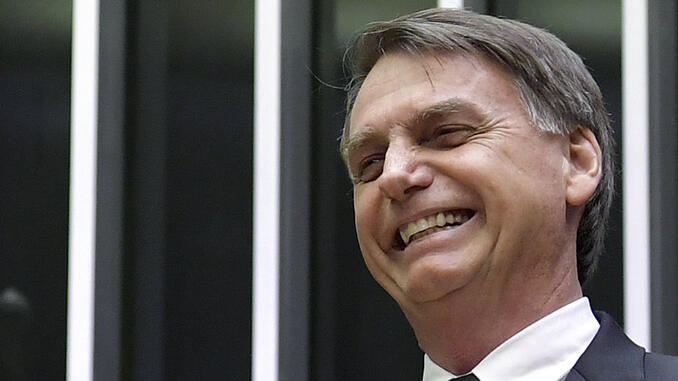
Jair Bolsonaro will become Brazil’s next president on January 1 after he handily won October’s election and runoff. Bolsonaro, an ex-paratrooper, and who served 27 years in the Brazilian National Congress, is labeled as a far-right populist and has been nicknamed the “Trump of the Tropics.” He is known more for his political rhetoric than for anything particular he did while serving in Congress. His life was seriously jeopardized during the election when he was stabbed in the stomach during a rally in Minas Gerais on September 7. Despite the seriousness of his wound, which by one report he lost up to 40 percent of his blood, he went on to complete the election.
The last time this blog discussed Brazil’s presidential election was in January with Lula da Silva heading for a constitutional showdown by choosing to run for president despite being convicted of corruption and money laundering as part of the ongoing investigation Operacao Lava Jato (Operation Car Wash) which continues to expose much government corruption. At the time he led his nearest rival, Bolsonaro, by 36 percent in the polls. He was jailed in April after a brief standoff with police where he now is serving out a term of 12 years. In August a court ruled he could not run for a third term as president, leaving Bolsonaro the frontrunner.
With the country reeling from the massive corruption scandals being exposed by prosecutors, Bolsonaro used the situation to threaten prison for his opponents regardless of any involvement in the scandals. “Either they go overseas, or they go to jail… These red outlaws will be banished from our homeland. It will be a cleanup the likes of which has never been seen in Brazilian history… We are the majority. We are the true Brazil. Together with this Brazilian people we will build a new nation… We are the voice of freedom… We do not want socialism,” he declared during a videolink from his home where he was recovering from his stabbing. His rhetoric about jailing his opponents and his praise at times for Brazil’s past dictators has alarmed many observers.
During the campaign Jair Bolsonaro took a hardcore line against crime by encouraging police to shoot criminals. The latter comes in response to Brazil’s record-breaking murder rate which continues to climb. Nearly 64,000 people were murdered in 2017 alone, which beat out the previous year’s record number. Bolsonaro said in August, “This kind of people [criminals], you cannot treat them as if they were normal human beings, ok? We can’t let policemen keep dying at the hands of those guys… If he [police] kills 10, 15, or 20 with 10 or 30 bullets each, he needs to get a medal and not be prosecuted.” Some see Bolsonaro’s tough stance on crime as echoing those of Filipino President Rodrigo Duterte.
Bolsonaro also has a history of making racist, sexist, and homophobic remarks. Last year he spoke about a black settlement founded by the descendants of Brazil’s slaves saying of the residents “They do nothing. They are not even good for procreation.” He described black activists as “animals” that should “go back to the zoo.” When it comes to women, he once told a female colleague in Congress that she was too ugly to rape. “I’m not going to rape you,” he said, “because you’re very ugly.” He had to clarify that comment by saying he was not a rapist. Bolsonaro even once demeaned his own daughter when he was discussing his children, “I had four sons, but then I had a moment of weakness, and the fifth was a girl.” He made his views known about what he thought of homosexuality when he stated in 2011, “I’d rather have my son die in a car accident than have him show up dating some guy.”
In Congress Bolsonaro favored government intervention in the economy, but as a candidate for president his rhetoric was more free-market orientated. Along with skyrocketing crime and the exposure of massive amounts of government corruption, the Brazilian economy has been struggling since 2014 when it hit its deepest ever recession. The economy shrank by seven percent before beginning to make the faintest of recoveries last year. Unemployment has been holding around 12 percent. Bolsonaro plans to make Paulo Guedes his top economic advisor and a “Super Minister” once he takes office. Guedes proposes sweeping changes in order to boost the economy. Among those are pension reform, privatization, tax cuts, and more bilateral trade deals. It is unclear how much backing Bolsonaro will give Guedes. The issue of pension reform proved to be too toxic for Brazil’s current president, Michel Temer. Bolsonaro has also rejected a plan by Guedes to privatize one of Brazil’s main utility companies, Electrobras.
While campaigning, Bolsonaro spoke of closer relations with the U.S. and adopted some of Donald Trump’s rhetoric on China. Brazil’s economy is heavily dependent on exports to China. So much so, that slowing growth in China exacerbated Brazil’s recession. However, Bolsonaro was critical of China during the campaign when he accused China of “buying Brazil itself.” He may struggle to balance the two competing forces of anti-China sentiment and bringing about a closer relationship with Washington in order to create economic growth.
Jair Bolsonaro’s election victory is widely seen as a result of the disillusionment Brazilians have about government after suffering through the largest corruption scandal in their country’s history, record-breaking violent crime rates, and their deepest recession in history rather than outright endorsement of his proposals. His rhetoric has alarmed many, yet he was still overwhelmingly elected. Brazilians desperately want change, but have they put their democracy at greater risk by electing Bolsonaro? The eyes of the world will be glued to South America’s largest country waiting to see what happens.
